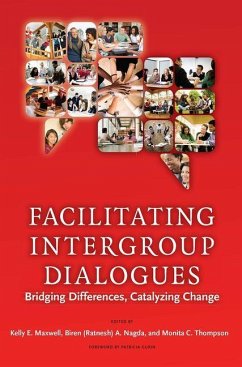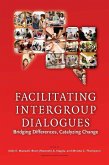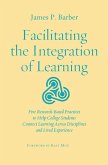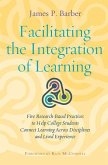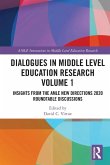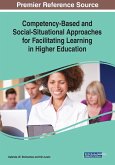Kelly E. Maxwell, Biren Ratnesh Nagda, Monita C. Thompson
Facilitating Intergroup Dialogues
Bridging Differences, Catalyzing Change
Kelly E. Maxwell, Biren Ratnesh Nagda, Monita C. Thompson
Facilitating Intergroup Dialogues
Bridging Differences, Catalyzing Change
- Broschiertes Buch
- Merkliste
- Auf die Merkliste
- Bewerten Bewerten
- Teilen
- Produkt teilen
- Produkterinnerung
- Produkterinnerung
Co-published with Intergroup dialogue has emerged as an effective educational and community building method to bring together members of diverse social and cultural groups to engage in learning together so that they may work collectively and individually to promote greater diversity, equality and justice.
Andere Kunden interessierten sich auch für
![Facilitating Intergroup Dialogues Facilitating Intergroup Dialogues]() Kelly E MaxwellFacilitating Intergroup Dialogues188,99 €
Kelly E MaxwellFacilitating Intergroup Dialogues188,99 €![Facilitating the Integration of Learning Facilitating the Integration of Learning]() James P. BarberFacilitating the Integration of Learning185,99 €
James P. BarberFacilitating the Integration of Learning185,99 €![Facilitating the Integration of Learning Facilitating the Integration of Learning]() James P. BarberFacilitating the Integration of Learning39,99 €
James P. BarberFacilitating the Integration of Learning39,99 €![Facilitating Experiential Learning in Higher Education Facilitating Experiential Learning in Higher Education]() Roland TormeyFacilitating Experiential Learning in Higher Education185,99 €
Roland TormeyFacilitating Experiential Learning in Higher Education185,99 €![Dialogues in Middle Level Education Research Volume 1 Dialogues in Middle Level Education Research Volume 1]() Dialogues in Middle Level Education Research Volume 1185,99 €
Dialogues in Middle Level Education Research Volume 1185,99 €![Dialogues in Middle Level Education Research Volume 1 Dialogues in Middle Level Education Research Volume 1]() Dialogues in Middle Level Education Research Volume 158,99 €
Dialogues in Middle Level Education Research Volume 158,99 €![Competency-Based and Social-Situational Approaches for Facilitating Learning in Higher Education Competency-Based and Social-Situational Approaches for Facilitating Learning in Higher Education]() Competency-Based and Social-Situational Approaches for Facilitating Learning in Higher Education140,99 €
Competency-Based and Social-Situational Approaches for Facilitating Learning in Higher Education140,99 €-
-
-
Co-published with Intergroup dialogue has emerged as an effective educational and community building method to bring together members of diverse social and cultural groups to engage in learning together so that they may work collectively and individually to promote greater diversity, equality and justice.
Hinweis: Dieser Artikel kann nur an eine deutsche Lieferadresse ausgeliefert werden.
Hinweis: Dieser Artikel kann nur an eine deutsche Lieferadresse ausgeliefert werden.
Produktdetails
- Produktdetails
- Verlag: Routledge
- Seitenzahl: 252
- Erscheinungstermin: 8. Februar 2011
- Englisch
- Abmessung: 229mm x 152mm x 14mm
- Gewicht: 371g
- ISBN-13: 9781579222918
- ISBN-10: 1579222919
- Artikelnr.: 31184130
- Herstellerkennzeichnung
- Libri GmbH
- Europaallee 1
- 36244 Bad Hersfeld
- gpsr@libri.de
- Verlag: Routledge
- Seitenzahl: 252
- Erscheinungstermin: 8. Februar 2011
- Englisch
- Abmessung: 229mm x 152mm x 14mm
- Gewicht: 371g
- ISBN-13: 9781579222918
- ISBN-10: 1579222919
- Artikelnr.: 31184130
- Herstellerkennzeichnung
- Libri GmbH
- Europaallee 1
- 36244 Bad Hersfeld
- gpsr@libri.de
Kelly E. Maxwell is Co-Director, The Program on Intergroup Relations, University of Michigan. Biren Ratnesh Nagda is Associate Professor of Social Work and Director, Intergroup Dialogue, Education & Action (IDEA) Center, at the University of Washington Monita C. Thompson is Co-Director, The Program on Intergroup Relations, University of Michigan. Patricia Gurin is Nancy Cantor Distinguished University Professor Emerita of Psychology and Women's Studies, University of Michigan
Foreword-Patricia Gurin 1. Deepening the Layers of Understanding and
Connection. A Critical-Dialogic Approach to Facilitating Intergroup
Dialogues-Biren (Ratnesh. A. Nagda and Kelly E. Maxwell 2. In the Hands of
Facilitators - Student Experiences in Dialogue and Implications for
Facilitator Training-Anna M. Yeakley SECTION ONE. Intergroup Dialogue
Facilitation. Training for Classroom-based Experiences 3. Training Peer
Facilitators as Social Justice Educators. Integrating Cognitive and
Affective Learning-Kelly E. Maxwell, Roger B. Fisher, Monita C. Thompson,
and Charles Behling 4. Facilitator Training in Diverse, Progressive
Residential Communities. Occidental College as a Case Study-Jaclyn
Rodríguez, Andrea Rodríguez-Scheel, Shaquanda Lindsey, and Ariel Kirkland
5. Preparing Critically Reflective Intergroup Dialogue Facilitators. A
Pedagogical Model and Illustrative Example-Ximena Zúñiga, Tanya Kachwaha,
Keri DeJong, and Romina Pacheco 6. (Re)Training Ourselves. Professionals
Who Facilitate Intergroup Dialogue-Kathleen (Wong. Lau, Joycelyn
Landrum-Brown, and Thomas E. Walker SECTION TWO. Intergroup Dialogue
Facilitation Training for Applications to Campus and Community Settings 7.
Training Students to Change Their Own Campus Culture Through Sustained
Dialogue-Priya Parker, Teddy Nemeroff, and Christina Kelleher 8. Democracy
Lab. Online Facilitation Training for Dialogic Teaching and Learning-James
T. Knauer 9. Intergroup Dialogue Facilitation for Youth Empowerment and
Community Change-Roger B. Fisher and Barry N. Checkoway 10. Extending
Intergroup Dialogue Facilitation to Multicultural Social Work
Practice-Michael S. Spencer, David J. Martineau, and naomi m. warren
SECTION THREE. Learning From and With Intergroup Dialogue Facilitators.
Voices on Identity, Alliances, and Career Commitments 11. Identity Matters.
Facilitators' Struggles and Empowered Use of Social Identities in
Intergroup Dialogue-Kelly E. Maxwell, Mark Chesler, and Biren (Ratnesh. A.
Nagda 12. Not FOR Others, But WITH Others, For ALL of Us. Weaving
Relationships, Co-Creating Spaces of Justice-Biren (Ratnesh. A. Nagda,
Norma Timbang, Nichola G. Fulmer, and Thai Hung V. Tran 13. Changing
Facilitators, Facilitating Change:The Lives of Intergroup Dialogue
Facilitators Post-College-Carolyn Vasques-Scalera
Connection. A Critical-Dialogic Approach to Facilitating Intergroup
Dialogues-Biren (Ratnesh. A. Nagda and Kelly E. Maxwell 2. In the Hands of
Facilitators - Student Experiences in Dialogue and Implications for
Facilitator Training-Anna M. Yeakley SECTION ONE. Intergroup Dialogue
Facilitation. Training for Classroom-based Experiences 3. Training Peer
Facilitators as Social Justice Educators. Integrating Cognitive and
Affective Learning-Kelly E. Maxwell, Roger B. Fisher, Monita C. Thompson,
and Charles Behling 4. Facilitator Training in Diverse, Progressive
Residential Communities. Occidental College as a Case Study-Jaclyn
Rodríguez, Andrea Rodríguez-Scheel, Shaquanda Lindsey, and Ariel Kirkland
5. Preparing Critically Reflective Intergroup Dialogue Facilitators. A
Pedagogical Model and Illustrative Example-Ximena Zúñiga, Tanya Kachwaha,
Keri DeJong, and Romina Pacheco 6. (Re)Training Ourselves. Professionals
Who Facilitate Intergroup Dialogue-Kathleen (Wong. Lau, Joycelyn
Landrum-Brown, and Thomas E. Walker SECTION TWO. Intergroup Dialogue
Facilitation Training for Applications to Campus and Community Settings 7.
Training Students to Change Their Own Campus Culture Through Sustained
Dialogue-Priya Parker, Teddy Nemeroff, and Christina Kelleher 8. Democracy
Lab. Online Facilitation Training for Dialogic Teaching and Learning-James
T. Knauer 9. Intergroup Dialogue Facilitation for Youth Empowerment and
Community Change-Roger B. Fisher and Barry N. Checkoway 10. Extending
Intergroup Dialogue Facilitation to Multicultural Social Work
Practice-Michael S. Spencer, David J. Martineau, and naomi m. warren
SECTION THREE. Learning From and With Intergroup Dialogue Facilitators.
Voices on Identity, Alliances, and Career Commitments 11. Identity Matters.
Facilitators' Struggles and Empowered Use of Social Identities in
Intergroup Dialogue-Kelly E. Maxwell, Mark Chesler, and Biren (Ratnesh. A.
Nagda 12. Not FOR Others, But WITH Others, For ALL of Us. Weaving
Relationships, Co-Creating Spaces of Justice-Biren (Ratnesh. A. Nagda,
Norma Timbang, Nichola G. Fulmer, and Thai Hung V. Tran 13. Changing
Facilitators, Facilitating Change:The Lives of Intergroup Dialogue
Facilitators Post-College-Carolyn Vasques-Scalera
Foreword-Patricia Gurin 1. Deepening the Layers of Understanding and
Connection. A Critical-Dialogic Approach to Facilitating Intergroup
Dialogues-Biren (Ratnesh. A. Nagda and Kelly E. Maxwell 2. In the Hands of
Facilitators - Student Experiences in Dialogue and Implications for
Facilitator Training-Anna M. Yeakley SECTION ONE. Intergroup Dialogue
Facilitation. Training for Classroom-based Experiences 3. Training Peer
Facilitators as Social Justice Educators. Integrating Cognitive and
Affective Learning-Kelly E. Maxwell, Roger B. Fisher, Monita C. Thompson,
and Charles Behling 4. Facilitator Training in Diverse, Progressive
Residential Communities. Occidental College as a Case Study-Jaclyn
Rodríguez, Andrea Rodríguez-Scheel, Shaquanda Lindsey, and Ariel Kirkland
5. Preparing Critically Reflective Intergroup Dialogue Facilitators. A
Pedagogical Model and Illustrative Example-Ximena Zúñiga, Tanya Kachwaha,
Keri DeJong, and Romina Pacheco 6. (Re)Training Ourselves. Professionals
Who Facilitate Intergroup Dialogue-Kathleen (Wong. Lau, Joycelyn
Landrum-Brown, and Thomas E. Walker SECTION TWO. Intergroup Dialogue
Facilitation Training for Applications to Campus and Community Settings 7.
Training Students to Change Their Own Campus Culture Through Sustained
Dialogue-Priya Parker, Teddy Nemeroff, and Christina Kelleher 8. Democracy
Lab. Online Facilitation Training for Dialogic Teaching and Learning-James
T. Knauer 9. Intergroup Dialogue Facilitation for Youth Empowerment and
Community Change-Roger B. Fisher and Barry N. Checkoway 10. Extending
Intergroup Dialogue Facilitation to Multicultural Social Work
Practice-Michael S. Spencer, David J. Martineau, and naomi m. warren
SECTION THREE. Learning From and With Intergroup Dialogue Facilitators.
Voices on Identity, Alliances, and Career Commitments 11. Identity Matters.
Facilitators' Struggles and Empowered Use of Social Identities in
Intergroup Dialogue-Kelly E. Maxwell, Mark Chesler, and Biren (Ratnesh. A.
Nagda 12. Not FOR Others, But WITH Others, For ALL of Us. Weaving
Relationships, Co-Creating Spaces of Justice-Biren (Ratnesh. A. Nagda,
Norma Timbang, Nichola G. Fulmer, and Thai Hung V. Tran 13. Changing
Facilitators, Facilitating Change:The Lives of Intergroup Dialogue
Facilitators Post-College-Carolyn Vasques-Scalera
Connection. A Critical-Dialogic Approach to Facilitating Intergroup
Dialogues-Biren (Ratnesh. A. Nagda and Kelly E. Maxwell 2. In the Hands of
Facilitators - Student Experiences in Dialogue and Implications for
Facilitator Training-Anna M. Yeakley SECTION ONE. Intergroup Dialogue
Facilitation. Training for Classroom-based Experiences 3. Training Peer
Facilitators as Social Justice Educators. Integrating Cognitive and
Affective Learning-Kelly E. Maxwell, Roger B. Fisher, Monita C. Thompson,
and Charles Behling 4. Facilitator Training in Diverse, Progressive
Residential Communities. Occidental College as a Case Study-Jaclyn
Rodríguez, Andrea Rodríguez-Scheel, Shaquanda Lindsey, and Ariel Kirkland
5. Preparing Critically Reflective Intergroup Dialogue Facilitators. A
Pedagogical Model and Illustrative Example-Ximena Zúñiga, Tanya Kachwaha,
Keri DeJong, and Romina Pacheco 6. (Re)Training Ourselves. Professionals
Who Facilitate Intergroup Dialogue-Kathleen (Wong. Lau, Joycelyn
Landrum-Brown, and Thomas E. Walker SECTION TWO. Intergroup Dialogue
Facilitation Training for Applications to Campus and Community Settings 7.
Training Students to Change Their Own Campus Culture Through Sustained
Dialogue-Priya Parker, Teddy Nemeroff, and Christina Kelleher 8. Democracy
Lab. Online Facilitation Training for Dialogic Teaching and Learning-James
T. Knauer 9. Intergroup Dialogue Facilitation for Youth Empowerment and
Community Change-Roger B. Fisher and Barry N. Checkoway 10. Extending
Intergroup Dialogue Facilitation to Multicultural Social Work
Practice-Michael S. Spencer, David J. Martineau, and naomi m. warren
SECTION THREE. Learning From and With Intergroup Dialogue Facilitators.
Voices on Identity, Alliances, and Career Commitments 11. Identity Matters.
Facilitators' Struggles and Empowered Use of Social Identities in
Intergroup Dialogue-Kelly E. Maxwell, Mark Chesler, and Biren (Ratnesh. A.
Nagda 12. Not FOR Others, But WITH Others, For ALL of Us. Weaving
Relationships, Co-Creating Spaces of Justice-Biren (Ratnesh. A. Nagda,
Norma Timbang, Nichola G. Fulmer, and Thai Hung V. Tran 13. Changing
Facilitators, Facilitating Change:The Lives of Intergroup Dialogue
Facilitators Post-College-Carolyn Vasques-Scalera

